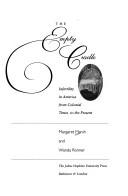Check nearby libraries
Buy this book

Is infertility on the rise because women are delaying childbearing in order to pursue careers? Has it reached "epidemic" proportions among affluent and educated Americans? Does infertility affect the well-off more than the poor, or white Americans more than black Americans? Have the new reproductive technologies dramatically increased the success of infertility treatment? Most Americans would answer "Yes" to these questions - and most Americans would be wrong.
In The Empty Cradle, Margaret Marsh and Wanda Ronner delve into the origins of these and other misconceptions as they explore how medical and cultural beliefs about infertility emerge from its history. Drawing on a wide variety of sources - including intimate diaries and letters, patient records, memoirs, medical literature, and popular magazines - The Empty Cradle investigates the social, cultural, scientific, and medical dimensions of infertility over the past three hundred years.
Telling a story that begins long before infertility was viewed as a medical problem, Marsh and Ronner show how generations of women responded both to their own desire for children and to the enormous pressure placed on them by the cultural expectation that all women should want to be mothers. In colonial America, a woman's inability to bear children was explained as the will of God or, perhaps, the work of the devil.
By the middle of the nineteenth century, infertility was increasingly seen as a medical condition calling for therapeutic intervention - but also as a condition for which women themselves were held responsible. The authors describe how physicians in the late nineteenth century argued that women who attended college, or had intellectual interests beyond marriage and motherhood, brought infertility upon themselves, because women who put energy into mental pursuits had none left for reproducing. Even in contemporary America, women find themselves faulted for placing themselves at risk for infertility problems when they postpone motherhood in order to establish careers.
Not until the twentieth century, the authors observe, did many practitioners accept the fact that men are infertile as often as women.
In tracing the long history of scientific and medical understanding of infertility, The Empty Cradle also challenges the idea that reproductive technology and the controversies that surround it are of recent origin. Donor insemination, for example, has been practiced since at least the late nineteenth century.
So-called ovarian transplantations, performed in the early twentieth century, foreshadowed the modern practice of egg donation, and the first experiments in human in vitro fertilization date back to the 1930s. Marsh and Ronner also tell the little-known story of free and low-cost clinics in the urban North where low-income women were treated for infertility beginning in the nineteenth century.
And they explore reactions - among both physicians and husbands - to the emerging scientific evidence that infertility is a condition for which men and women bear equal responsibility.
Check nearby libraries
Buy this book

Previews available in: English
Subjects
History, Infertility, Reproduction Techniques, History of Medicine, 18th Cents, Motherhood, Trends, Therapy, Childlessness, Infertility -- United States -- History, Childlessness -- United States -- History, Motherhood -- United States -- History, Infertility -- therapy, Reproduction Techniques -- trends, Reproductive Techniques, History, 18th CenturyPlaces
United StatesShowing 1 featured edition. View all 1 editions?
| Edition | Availability |
|---|---|
|
1
The empty cradle: infertility in America from Colonial times to the present
1996, Johns Hopkins University Press
in English
0801852285 9780801852282
|
aaaa
Libraries near you:
WorldCat
|
Book Details
Edition Notes
Includes bibliographical references and index.
Classifications
External Links
The Physical Object
ID Numbers
Community Reviews (0)
Feedback?History
- Created April 1, 2008
- 19 revisions
Wikipedia citation
×CloseCopy and paste this code into your Wikipedia page. Need help?
| 2 days ago | Edited by MARC Bot | import existing book |
| March 7, 2023 | Edited by MARC Bot | import existing book |
| January 6, 2023 | Edited by MARC Bot | import existing book |
| November 16, 2022 | Edited by MARC Bot | import existing book |
| April 1, 2008 | Created by an anonymous user | Imported from Scriblio MARC record |










